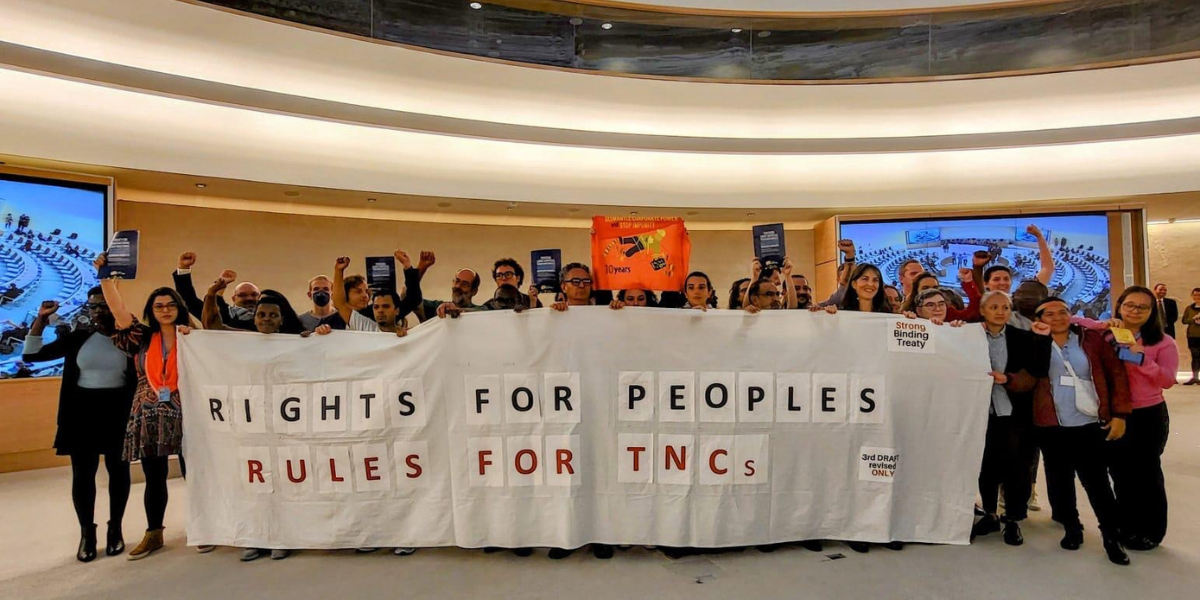Geneva, 28 October 2022.
A Treaty to regulate the activities of transnational corporations and to ensure access to justice for victims, is more urgent than ever. In the absence of such treaty, we can clearly see the devastation that global companies are causing to human rights and the environment, all over the world, from the Brumadinho Dam Collapse in Brazil, to widespread land grabbing in Africa.
Negotiations for a legally binding instrument to regulate corporations continued last week in Geneva. The lack of engagement of delegations from the EU and the UK is dismissive and an insult to affected communities. The informal text proposal, put forward by the chairmanship, is an affront to those who have been active in the process during the last 8 years.
“Corporate abuses have become an accepted consequence of economic activity and the international community seems to accept the violence that this brings on our human family and our common home” claimed Viviana Tacha, Executive Director of Siembra, prominent human-rights organization in Colombia.
The proposal that nobody needed
The 8th session opened with a turbulent and confused atmosphere. The Ecuadorian Presidency, in charge of leading the process, had sent a new text proposal only two weeks before the negotiations began. In both form and substance, the introduction of this document was not carried out in an agreed and transparent manner, and its provisions also undermine the demands of communities affected by transnational corporations and other businesses.
“While we’re moving closer to a Treaty, this year we saw a messy process and a divisive attempt to water down the Treaty in a non-transparent manner. This approach tried to sideline the hard work by many states across the world. The third revised draft of the Treaty is the result of 8 years of negotiations, the Chair cannot simply ignore the contributions of States and civil society” said Garry Walsh, Policy and Advocacy advisor at Trócaire in Ireland.
What are the Friends of the Chair doing?
At the previous session in 2021, the Ecuadorian Chair of the Working Group suggested the creation of a “Friends of the Chair” group to help find consensus on the text. However, the last-minute formation of this group, the unclarity of its mandate, together with an imbalance of regional membership have prevented this group from being effective.
“We need the group of Friends to be regionally balanced, and to work in a way that is transparent and inclusive of civil society, indigenous peoples, trade unions and peasants. We owe it to the planet and to future generations” said Clara Alibert, Advocacy officer at CCFD – Terre Solidaire in France.
Still waiting for an ambitious EU mandate and for the UK to engage constructively
The EU must formally and ambitiously enter the negotiations, especially now that an EU Directive proposal on corporate sustainability due diligence is being negotiated. The two instruments are complementary, as shown by a recent study.
“The EU’s new due diligence directive and the future Treaty must work in tandem to ensure communities have access to justice when their lives are threatened by corporate abuse” said Elise Kervyn, Senior Advisor on Business and Human Rights at CIDSE. “The EU simply can’t turn up to the next session in 12 months’ time yet again without officially engaging on the Treaty. The need for a mandate is now”.
“While the EU has shown some presence, the UK is on a completely different track. They still promote voluntary rules for business, when it’s clear these are failing to prevent harm to people and the planet. The UK must engage constructively to develop a strong Treaty – or it risks being left behind by other states and becoming a laggard on business and human rights” said Louise Elridge, Lead Policy Advisor – Private Sector at the Catholic Agency for Overseas Develop (CAFOD) in the UK.
People and planet over profit: listen to the voices of those affected
Church figures have also engaged and spoken up in support of affected communities.
“The Bishops of West Africa want to recall that the people on the front lines of corporate crime must be heard, and their voices and experiences must shape the future Treaty, including clearly establishing the right of local and indigenous communities to say no to unwanted or harmful projects on their territories” said Father Vincent de Paul, the 1st deputy secretary general of the Regional Episcopal Conference of West Africa (RECOWA).
Credit photos: Treaty Alliance.

